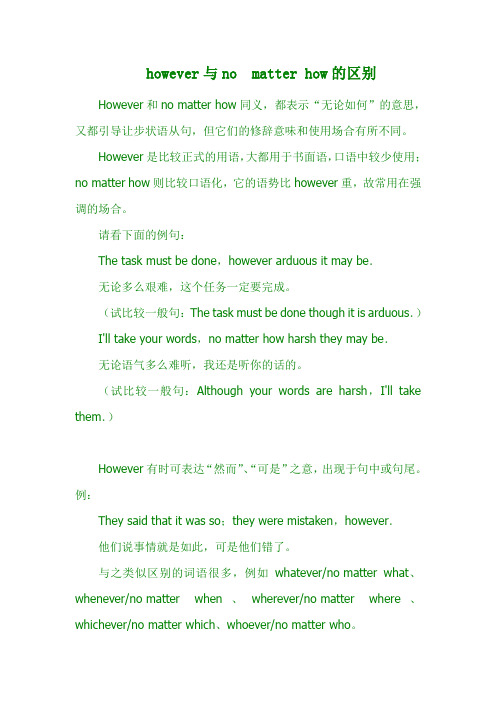however的状语从句
- 格式:docx
- 大小:17.83 KB
- 文档页数:2

【导语】状语从句(Adverbial Clause)状语从句指句⼦⽤作状语时,起副词作⽤的句⼦。
它可以修饰谓语、⾮谓语动词、定语、状语或整个句⼦。
根据其作⽤可分为时间、地点、原因、条件、⽬的、结果、让步、⽅式和⽐较等从句。
状语从句⼀般由连词(从属连词)引导,也可以由词组引起。
从句位于句⾸或句中时通常⽤逗号与主句隔开,位于句尾时可以不⽤逗号隔开。
下⾯是整理发布的九⼤状语从句引导词总结,欢迎阅读参考!更多相关讯息请关注!1、时间状语从句常⽤引导词:when、as、while、as soon as、before、after、since、till、until特殊引导词:the minute、the moment、the second、every time、the day、immediately、directly、no sooner…than(⼀……就……)、hardly…when(刚⼀……就……)、scarcely…when(⼏乎没有…的时候)2、地点状语从句常⽤引导词:where特殊引导词:wherever、anywhere、everywhere3、原因状语从句常⽤引导词:because、since、as、for特殊引导词:seeing that、now that、in that、considering that、given that4、结果状语从句常⽤引导词:so…that、such…that特殊引导词:such that、to the degree that、to the extent that、to such a degree that5、⽬的状语从句常⽤引导词:so that、such that特殊引导词:to the degree that、to the extent that、to such a degree that、in order that6、条件状语从句常⽤引导词:if、unless、whether(whether…or not)特殊引导词:as/so long as、only if、providing/provide that、supposing that、in case that、on condition that7、让步状语从句常⽤引导词:though、although、even if、even though特殊引导词:as(⽤在让步状语从句中必须要倒装)、while(⼀般⽤在句⾸)、no matter…、in spite of the fact that、whatever、whoever、wherever、whenever、however、whichever8、⽅式状语从句常⽤引导词:as、as if、how特殊引导词:the way9、⽐较状语从句常⽤引导词:as(同级⽐较)、than(不同程度的⽐较)特殊引导词:the more…the more…、just as…、so…、A to B is what/as C is to D、no…more than、not so much A as B。

一、while, but, however作并列连词的区别1, "while"着重强调前后两者对比。
如:Tom is reading while Jim playing football.当吉姆在玩足球的时候,汤姆正在读书。
I am doing homework while you are sleeping.当你在睡觉的时候,我正在做家庭作业。
2,"But"着重强调前后意思转折,并且转折的语气最为强烈,用的最多。
如:I really want to go shopping with you,but I do have no money.我是真的很想和你一起购物,但是我身上确实没钱啊.You can jion us in this game,but you must comply with rules of the game.你可以加入我们,但是你必须遵守游戏规则"。
3,"however"的用法很简单,一般放在两句之间,前后用逗号隔开独立成句,表示意思的转折,译为"然而、不过"。
如:You should finish your work before nine o'clock,however,you can have a break before you start it.你应该在9点之前完成你的工作,不过在开始之前你可以稍做休息。
I asked uncle LI for more money,however, I have enough money to buy it.我问李叔叔要了更多的钱,然而我自己有足够的钱买下它。
三者的强调语气由强到弱排列顺序是:but, however, while二、while, when, as引导时间状语从句时的区别:①while引导的状语从句中动词必须是持续性。
谓语动词多为进行时,或状态动词的一般时。

however的让步状语从句however是表示转折的单词,在英语里的使用频率非常高,那么however的让步状语从句是什么样的呢?下面是店铺为你整理的however的让步状语从句,希望大家喜欢!however的让步状语从句howeveradv.不管到什么程度; 无论如何; 然而; 可是conj.不管怎样;however引导让步状语从句后面加形容词或副词引导让步状语从句时 however 本身是副词后面可以跟形容词或副词但也可以不跟直接修饰动词如跟形容词however hard it may be ,do your best.无论多么艰难总要尽你的力量去做.跟副词however hard he worked ,he didn't pass the exam .无论他多么努力他还是考试不及格不跟however he worked ,he didn't satisfy his boss .无论他怎么干老板都不满意.however的例句1. The mechanics of the job, however, have changed little since then.不过,工作流程从那以后就几乎没有任何变化。
2. The deal with Chelsea may not, however, be dead.不过,与切尔西的交易或许还有戏。
3. What is missing, however, is an internal, artistic cohesion.不过,缺乏的是一种内在的艺术凝聚力。
4. However, many customers found the smell of this product distinctly off-putting.然而,很多顾客觉得该产品有一股异味,非常难闻。
5. When angry or excited, however, he could be wild, profane,and terrifying.但愤怒或激动的时候,他也会发狂、会骂人、令人生畏。

however与no matter how的区别However和no matter how同义,都表示“无论如何”的意思,又都引导让步状语从句,但它们的修辞意味和使用场合有所不同。
However是比较正式的用语,大都用于书面语,口语中较少使用;no matter how则比较口语化,它的语势比however重,故常用在强调的场合。
请看下面的例句:
The task must be done,however arduous it may be.
无论多么艰难,这个任务一定要完成。
(试比较一般句:The task must be done though it is arduous.)I'll take your words,no matter how harsh they may be.
无论语气多么难听,我还是听你的话的。
(试比较一般句:Although your words are harsh,I'll take them.)
However有时可表达“然而”、“可是”之意,出现于句中或句尾。
例:
They said that it was so;they were mistaken,however.
他们说事情就是如此,可是他们错了。
与之类似区别的词语很多,例如whatever/no matter what、whenever/no matter when、wherever/no matter where、whichever/no matter which、whoever/no matter who。

however和but的区别及用法
1. however作副词用时;表示“然而;但是”;可以位于句首、句中和句末;位于句首时;要用逗号与句子其它部分隔开;位于句中时;其前后都要用逗号;位于句末时其前用逗号分开. 例如:
She felt ill. She went to work; however; and tried to concentrate.
她病了.然而她照旧去上班;并且尽力集中精神工作.
His first response was to say no. Later; however; he changed his mind.
他最初的反应是不同意;可是后来他改变了主意.
2. however与but 两者都做“但是;然而”讲;而且都引出并列句.从语义上看;but所表示的是非常明显的对比;转折的意味较however要强.从语序上看;but总是位于所引出的分句之首;而however却可位于句首、句中和句末;同时从标点符号上看;but之后一般不得使用逗号;而however则必须用逗号与句子其它部分分开.例如:
I thought those figures were correct. However; I have recently heard they were not.
我原以为那些数字正确无误;不过我最近听说并不正确.
3. however的其它用法:however可以作连词conj.;表示“无论以何种方式;不管怎样”;引导让步状语从句.例如:
You can travel however you like.你可以随心所欲地去旅行.
However I approached the problem; I couldn’t find a solution.
这一问题我不管怎样都无法解决.。

whatever however引导让步状语从句以下是一篇3000-6000字长的文章,回答关于“[whatever however引导让步状语从句]”的问题。
引子:无论我们面对什么样的困难和挑战,无论情况如何复杂,[whatever however 引导让步状语从句]均能给予我们宝贵的启示和策略。
让我们在接下来的篇幅中,一步一步地探讨这些引导词在英语语法中的用法和相关例句。
希望通过这篇文章的阅读,您能够更加熟悉和掌握这些词语的运用,从而提升自己的英语表达能力。
第一节:介绍whatever引导的让步状语从句1.1 概述whatever是一个引导词,用来引导让步状语从句。
它的意思是“无论什么”,常用于表示无论情况如何复杂或无论选择如何,仍然坚持某种态度或行为。
1.2 用法whatever通常与be动词、动词原形、名词或形容词连用,构成whatever从句。
它可以在主语、谓语、宾语等句子成分中出现。
例如:- Whatever happens, I will always support you.(无论发生什么,我都会始终支持你。
)- I will do whatever it takes to achieve my goals.(我会竭尽全力去实现我的目标。
)- He can eat whatever he wants.(他可以吃他想吃的任何东西。
)1.3 注意事项在让步状语从句中,whatever可以与动词“do”连用,表示“做任何事情”。
例如:- Whatever you do, don't give up.(无论你做什么,都不要放弃。
)第二节:介绍however引导的让步状语从句2.1 概述however是另一个常用的引导词,用来引导让步状语从句。
它的意思是“无论如何”或“然而”,常用于表达一种对比、转折或相反的关系。
2.2 用法however通常位于主句和让步状语从句之间,用逗号与主句隔开。
whatever,whoever,whichever,whenever,wherever,however用法归纳一、引导状语从句它们都可用来引导状语从句(让步状语从句),其大意为“无论什么(是谁、哪一个、什么时候、什么地方、如何)”等,相当于英语中的no matter what (who, which, when, where, how)。
如:Whatever [No matter what] you say, I believe you. 无论你说什么,我都相信你。
Whoever [No matter who] telephones, tell them I’m out. 不管是谁打电话,都说我出去了。
Whichever [No matter which] day you come, I’ll be pleasedto see you. 无论你哪天来,我都欢迎。
Whenever [No matter when] you come, you are welcome. 你什么时候来,我们都欢迎。
We found the people friendly wherever [no matter where] we went. 无论我们走到哪里,我们都发现人们很友好。
However [No matter how] much he eats, he never gets fat. 无论他吃多少,他都不发胖。
注:有时从句谓语可用情态动词:无论他在哪里,我都要找到他。
正:I’ll find him, wherever he is.正:I’ll find him, wherever he may be.无论发生什么事都要保持冷静。
正:Keep calm, whatever happens.正:Keep calm, whatever may happen另外,whoever 的宾格也是whoever, 而不是whomever, 后者在现代英语已基本不用,有的词典已不收录此词。
however引导的让步状语从句however是引导让步状语从句的单词,那么however引导的让步状语从句是怎么样的呢?下面是店铺为你整理的however引导让步状语从句的相关资料,希望大家喜欢!however引导让步状语从句however作为连词时,引导让步状语从句,意思是“不管怎么样”.例:however much he eats, he never gets fat.不管他吃多少,他永远吃不胖.In one’s own home one can acts however he wishes.在自己家里一个人想干什么都行.however作为连词时一般只能引导让步状语从句However的用法(一)用作连接副词,相当于no matter how,引导让步状语从句,意思是“不管怎样……”“无论如何……”,具体结构有以下两种:1.however+形容词+主语+系动词,例:However rich people are,they always seem anxious to take more money.无论人们有多富裕,他们似乎总是渴望挣到更多的钱。
2.however+副词+主语+谓语,例:However fast he runs,he can’t catch up with us. 无论他跑得多快也不能赶上我们。
(二)用作连词,引导让步状语从句,意思是“怎么样都行”。
例:In one’s own home one can acts however he wishes. 在自己家里一个人想干什么都行。
行下去。
<作定语>however的常见句型adv. 然而;无论如何;不管多么conj. 不管怎样用作副词I'll come however busy I am.我不管怎么忙都会来的。
You won't be able to do it alone, however much you try.无论你多么努力,你一个人也做不下来。
however引导的是让步状语从句还是方式状语从句是让步状语,而不是方式状语。
however 本身可以是方式副词或程度副词,在从句中作方式状语或程度状语。
在你的句子中however 是happen 的方式状语。
在“You won't succeed, however hard you may try.'这一句中,however 是 hard 的程度状语。
但对于主句来说,它引导的是让步状语。
你的句子的主句谓语是we'll be delighted. 逻辑上主句谓语不需要方式状语。
“无论”、“不管”之类的状语,英文归类为让步状语。
引导状语从句的关联词都是有语义的,提示从句是什么状语。
当一个关联词可以引导不同的状语从句时(如as),就需要根据上下文的逻辑来进行判断。
回复webster之商榷:however可以是方式副词,也可以是程度副词。
作为程度副词,它修饰从句中的一个形容词和副词或表示爱憎喜欢等意义的动词;作为方式副词,它修饰从句的谓语,表示从句的动作方式。
我不明白为什么程度副词引导的从句就可以认为是让步状语,而方式副词引导从句却是方式状语而不是让步状语?那么whenever,wherever引导是时间状语、地点状语从句还是让步状语从句?另外你给出的四个方式状语从句的句子都可以用no matter how 来改写。
You can do it no matter how you like. 你可以按自己的意思去做。
No matter how you look at it, it’s still a mess. 无论你怎么看,它还是一团糟。
You can spend the money no matter how you please. 你可以随意花这些钱。
No matter how you travel, it’ll take you at least three days. 不管你怎么走法,至少得用三天时间。
1.用作副词1) 表示让步:意为“无论如何”“不管怎样”,用来修饰形容词或副词,其词序为however+形容词或副词+主语+谓语。
这样用的however其实具有连放心不下中的功能,用以引导让步状语从句。
如:Phone me when you arrive,however late it is.你到达之后就给我打电放,不论多么晚也要打。
However much he eats,he never get fat.不管他吃多少,他永远吃不胖。
However cold it is,he always goes swimming.不管天有多冷,他都去游泳。
You won't move the stone,however strong you are.不管你力气有多大,也休想搬动那块石头。
However far it is,I intend to drive there tonight.不管有多远,我令晚也要开车到那儿去。
用于此用法时,请注意以下几点:(1)此用法属however所有用法中最重要的考点,同学们务请引起高度重视。
(2)这样用的however 与no matter how大致同意。
如:People always want more,however[no matter how] right they are.人总是富了还想再富。
However[No matter how] hard I worked,she was never satisfied.无论我多么努力地工作,她从来没满意过。
(3)有时从句谓语可用情态动词。
如:Don't laugh,however funny it may be.无论多么有趣也不要笑。
I'll try to finish it in time,however hard it may be.无论多么难,我也要按时完成。
(4)“however+形容词或副词+主语+谓语”有时可以有所省略。
however的状语从句
however的状语从句however作为连词时,引导让步状语从句,意思是“不管怎么样”.
例:
however much he eats, he never gets fat.
不管他吃多少,他永远吃不胖.
in one’s own home one can acts however he wishes.
在自己家里一个人想干什么都行.
however作为连词时一般只能引导让步状语从句
让步状语从句让步状语从句,是指状语从句中的一种,其本身也是状语从句。
一般翻译为“尽管……”或“即使……”,就是我们日常生活中用的“退一步说…”的感觉。
引导让步状语从句的连词主要有以下这些:
though,although,while,as; even if,even though; whether...or...; no matter+疑问词,疑问词-ever,regardless of+名词/名词短语/名词从句,despite,in spite of。
切记although,though 不可与but连用,但可以与still 和yet连用。
however的用法(一)用作连接副词,相当于no matter how,引导让步状语从句,意思是“不管怎样……”“无论如何……”,具体结构有以下两种:
1.however+形容词+主语+系动词,例:
however rich people are,they always seem anxious to take more money.
无论人们有多富裕,他们似乎总是渴望挣到更多的钱。
2.however+副词+主语+谓语,例:
however fast he runs,he can’t catch up with us. 无论他跑得多快也不能赶上我们。
(二)用作连词,引导让步状语从句,意思是“怎么样都行”。
例:
in one’s own home one can acts however he wishes. 在自己家里一个人想干什么都行。
行下去。